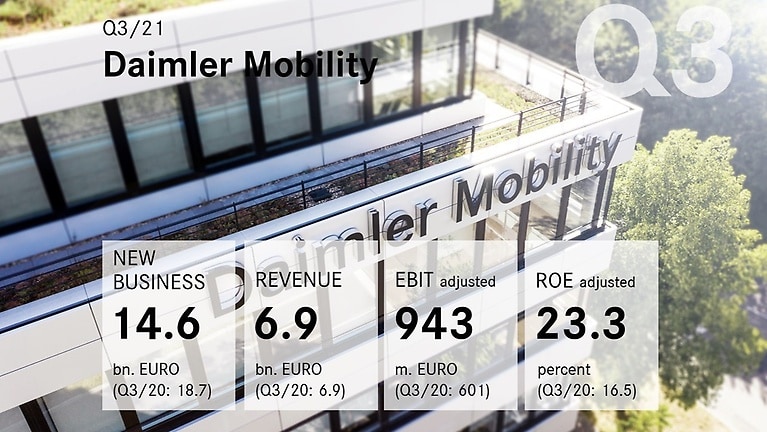
Mercedes-Benz Mobility AG
Siemensstr. 7
70469 Stuttgart
Deutschland
Tel.: +49 711 17 0
E-Mail: mobility@mercedes-benz.com
Please send queries about content on this website to any contact. You can address your concerns to us in English and your respective national language.
Represented by the Board of Management: Franz Reiner (Chairman), Jörg Lamparter, Susann Mayhead, Tolga Oktay, Peter Zieringer
Chairman of the Supervisory Board: Harald Wilhelm
Commercial Register Stuttgart, No. HRB 737788
VAT registration number: DE 81 11 20 930

Daimler AG‘s (ticker symbol: DAI) business performance demonstrated resilience in the third quarter ending September 30, 2021. Despite considerably lower production and sales due to the semiconductor shortage, revenue remained at the prior-year level. Group EBIT increased thanks to improved product mix, revenue quality and a tight grip on fixed costs. Demand for all products remains strong in all markets as the world’s pre-eminent luxury brand continues its global rollout of electric-only vehicles.
Total unit sales decreased by 25% to 577,800 passenger cars and commercial vehicles (Q3 2020: 772,700) mainly due to the global supply constraints. Group revenue remained at €40.1 billion (Q3 2020: €40.3 billion). The share from discontinued operations was €8.4 billion (Q3 2020: €8.7 billion). Group EBIT was €3,579 million (Q3 2020: €3,070 million). The share from discontinued operations was €680 million (Q3 2020: €559 million). Adjusted EBIT, reflecting the underlying business, was €3,611 million (Q3 2020: €3,479 million). Group net profit was €2,573 million (Q3 2020: €2,158 million). The share from discontinued operations was €549 million (Q3 2020: €347 million).


"We remain on track to meet our full-year targets thanks to a more robust business – resulting in an EBIT increase despite a challenging environment. At the same time, we made substantial progress with our strategic agenda: continuing the rollout of highly desirable electric vehicles, laying the groundwork for scaled up battery cell production with our intended stake in ACC, and through gaining shareholder approval for creating two pure-play companies."
Harald Wilhelm
Chief Financial Officer of Daimler AG
On July 30, 2021, the Board of Management of Daimler AG, with the approval of the Supervisory Board, resolved to spin off the former Daimler Trucks & Buses division, including the associated financial services business (Daimler Commercial Vehicles business). At the Extraordinary General Meeting on October 1, 2021, the shareholders of Daimler AG approved the spin-off with 99.9% of the represented share capital. As a result, the criteria for classification as discontinued operations and as assets and liabilities held for distribution or sale, have been met. Group figures within financial statements have been split into continued and discontinued operations. Continued operations are presented in the consolidated income statement; the result of the discontinued operations after taxes is shown in a separate line. The previous year's figures have been adjusted accordingly.
A tight grip on fixed costs, working capital and investment translated into a comfortable level of free cash flow. The free cash flow of the industrial business was €2,249 million (Q3 2020: €5,139 million), including important upfront investments in future products. The adjusted free cash flow of the industrial business was €2,833 million (Q3 2020: €5,345 million). The net liquidity of the industrial business amounted to €23.5 billion at the end of the third quarter, compared with €20.9 billion at the end of the second quarter 2021 and €17.9 billion at year-end 2020. The Group’s investments in property, plant and equipment in the third quarter totaled €1,106 million (Q3 2020: €1,193 million). Research & development expenditure amounted to €2,212 million (Q3 2020: €2,126 million).
At Daimler Mobility, new business decreased by 22% to €14.6 billion in the third quarter (Q3 2020: €18.7 billion) due to the semiconductor related lower sales level. Contract volume was €148.1 billion at the end of the quarter (end of the second quarter 2021: €150.6 billion / end of 2020: €150.6 billion). Revenue was €6.9 billion (Q3 2020: €6.9 billion). The division’s EBIT amounted to €943 million (Q3 2020: €589 million). At 23.3%, return on equity was much higher than the 16.2% in the prior-year period. Adjusted EBIT was €943 million (Q3 2020: €601 million) and adjusted return on equity was 23.3% (Q3 2020: 16.5%).
The financial performance of the division strongly benefitted from lower refinancing costs and the strong credit quality of the portfolio. Daimler Mobility is expanding its offering of support for EV sales but these remain at a level equivalent to ICE vehicles.

Sales at the Mercedes-Benz Cars & Vans division decreased by 30% to 471,400 vehicles in the third quarter (Q3 2020: 673,400). High-end vehicles including Mercedes-Maybach, Mercedes-AMG, the S-Class and G-Class as well as the GLE and GLS showed strong growth, with favourable mix and net pricing helping to partially offset semiconductor-driven supply constraints and raw material headwinds.
Revenue was €25.6 billion (Q3 2020: €25.8 billion). EBIT amounted to €2,004 million (Q3 2020: €2,118 million) and the return on sales was 7.8% (Q3 2020: 8.2%). Adjusted EBIT reached €2,175 million (Q3 2020: €2,417 million) with the adjusted return on sales at 8.5% (Q3 2020: 9.4%). Cash flow before interest and taxes (CFBIT) was €3,652 million (Q3 2020: €4,617 million). Adjusted CFBIT amounted to €4,127 million (Q3 2020: €4,821 million). The adjusted cash conversion rate (CCR) was 1.9 (Q3 2020: 2.0).
Sales at Mercedes-Benz Cars declined by 32% to 383,500 vehicles in the third quarter (Q3 2020: 566,600). The presentation of four new electric concepts and vehicles at the Munich IAA underlined the brand’s unrelenting focus on luxury and tech in the area of passenger cars. Mercedes-Benz Vans’ sales decreased by 18% to 88,000 vehicles (Q3 2020: 106,900). In the Vans segment, Mercedes-Benz introduced its new Citan and eCitan, launched a new battery variant for its eVito Tourer and started sales of its Sprinter 4x4.
For Daimler Trucks & Buses the third quarter was also a challenging one. The division’s operations and financial performance were impacted by supply chain constraints, mainly shortages of semiconductors, affecting especially the heavy duty segment. The division showed an increase in unit sales of 7% to 106,400 vehicles in the third quarter (Q3 2020: 99,300). Revenue was €8.9 billion (Q3 2020: €9.2 billion). EBIT amounted to €482 million (Q3 2020: €541 million) and the return on sales was 5.4% (Q3 2020: 5.9%). Adjusted EBIT was €489 million (Q3 2020: €603 million) and adjusted return on sales was 5.5% (Q3 2020: 6.5%). Cash flow before interest and taxes (CFBIT) showed an outflow of €576 million (Q3 2020: inflow of €1,142 million). Adjusted CFBIT amounted to an outflow of €527 million (Q3 2020: inflow of €1,142 million). The adjusted cash conversion rate (CCR) was minus 1.1 (Q3 2020: 1.9).
Unit sales at Daimler Trucks increased by 8% to 101,700 vehicles in the third quarter (Q3 2020: 94,100). Headwinds from raw materials were partially offset through increased net pricing. The North America order book for 2022 showed record incoming orders. Daimler Buses sold 4,700 vehicles, a decrease of 8% (Q3 2020: 5,100).
The economic conditions for worldwide demand for cars are likely to remain favourable during the rest of the year. It remains difficult to deliver an accurate forecast on how the supply situation will continue to develop. Daimler assumes that strained supply chains and bottlenecks for key components will continue to have a considerable impact on worldwide vehicle production also in the fourth quarter of the year. Daimler assumes in the fourth quarter an improved semiconductor supply situation compared with Q3, despite limited visibility and high volatility. The overriding structural shortage of semiconductors is expected to remain an issue in 2022 but should improve compared to 2021.
Based on the divisions’ current assessments, Daimler now expects Group revenues and Group EBIT in full-year to be significantly above the level of the previous year. Daimler assumes that the worldwide semiconductor shortage will affect Mercedes-Benz Cars and Mercedes-Benz Vans unit sales in the fourth quarter. Mercedes-Benz Cars now anticipates slightly lower unit sales in the full-year 2021 than in the previous year. Mercedes-Benz Vans now expects its unit sales in 2021 to be at the prior-year level. Following the drop in demand in 2020, major truck markets are expected to recover in 2021, which should also benefit the sales of Daimler Trucks & Buses. The division continues to anticipate a significant increase in unit sales, mainly reflecting the expectations for the markets in North America, Indonesia and the EU region.
Based on the performance in the first nine month of the year and the above mentioned assumptions, the divisions expect the following adjusted returns in the year 2021:
The calculation of the adjusted return on equity of the Daimler Mobility division does not include any impact on division EBIT from the deconsolidation of parts of the financial services business.
The adjusted cash conversion rate (ratio of cash flow to EBIT) for the Mercedes-Benz Cars & Vans division is now expected to be between 0.8 and 1.0 in 2021 (previously: 0.7 and 0.9). For Daimler Trucks & Buses, the adjusted cash conversion rate for full-year 2021 is also likely to be between 0.8 and 1.0 (unchanged, excluding effects from the spin-off).
Investments in property, plant and equipment in 2021 on a group level are expected to be slightly below the magnitude of the previous year (previously: in the magnitude of previous year); research & development investments on a group level are expected to be slightly (previously: significantly) above the prior year’s level.
Daimler now expects the free cash flow of the industrial business for 2021 to be at the prior-year level, excluding spin-off effects from Trucks & Buses (previously: slightly below 2020's figure). This includes payments agreed in the third quarter of 2020 in the context of the settlement with the US-regulators and plaintiff representatives of the consumer class actions relating to diesel emissions, cash-outs due to the restructuring program, higher cash taxes than in 2020, as well as costs related to the planned spin-off of Daimler Truck.
Link to capital market presentation third quarter: